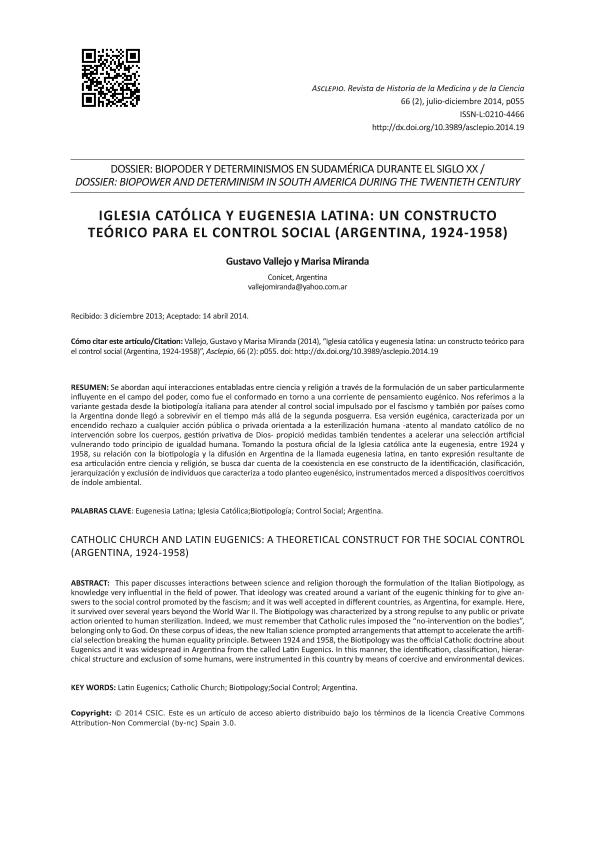Mostrar el registro sencillo del ítem
dc.contributor.author
Vallejo, Gustavo Gabriel

dc.contributor.author
Miranda, Marisa Adriana

dc.date.available
2018-01-15T19:19:21Z
dc.date.issued
2014-12
dc.identifier.citation
Vallejo, Gustavo Gabriel; Miranda, Marisa Adriana; Iglesia católica y eugenesia latina: un constructo teórico para el control social (Argentina, 1924-1958); Consejo Superior de Investigaciones Científicas. Servicio de Publicaciones; Asclepio; 66; 2; 12-2014; 1-12
dc.identifier.issn
0210-4466
dc.identifier.uri
http://hdl.handle.net/11336/33324
dc.description.abstract
Se abordan aquí interacciones entabladas entre ciencia y religión a través de la formulación de un saber particularmente influyente en el campo del poder, como fue el conformado en torno a una corriente de pensamiento eugénico. Nos referimos a la variante gestada desde la biotipología italiana para atender al control social impulsado por el fascismo y también por países como la Argentina donde llegó a sobrevivir en el tiempo más allá de la segunda posguerra. Esa versión eugénica, caracterizada por un encendido rechazo a cualquier acción pública o privada orientada a la esterilización humana -atento al mandato católico de no intervención sobre los cuerpos, gestión privativa de Dios- propició medidas también tendentes a acelerar una selección artificial vulnerando todo principio de igualdad humana. Tomando la postura oficial de la Iglesia católica ante la eugenesia, entre 1924 y 1958, su relación con la biotipología y la difusión en Argentina de la llamada eugenesia latina, en tanto expresión resultante de esa articulación entre ciencia y religión, se busca dar cuenta de la coexistencia en ese constructo de la identificación, clasificación, jerarquización y exclusión de individuos que caracteriza a todo planteo eugenésico, instrumentados merced a dispositivos coercitivos de índole ambiental.
dc.description.abstract
This paper discusses interactions between science and religion thorough the formulation of the Italian Biotipology, as knowledge very influential in the field of power. That ideology was created around a variant of the eugenic thinking for to give answers to the social control promoted by the fascism; and it was well accepted in different countries, as Argentina, for example. Here, it survived over several years beyond the World War II. The Biotipology was characterized by a strong repulse to any public or private action oriented to human sterilization. Indeed, we must remember that Catholic rules imposed the “no-intervention on the bodies”, belonging only to God. On these corpus of ideas, the new Italian science prompted arrangements that attempt to accelerate the artificial selection breaking the human equality principle. Between 1924 and 1958, the Biotipology was the official Catholic doctrine about Eugenics and it was widespread in Argentina from the called Latin Eugenics. In this manner, the identification, classification, hierarchical structure and exclusion of some humans, were instrumented in this country by means of coercive and environmental devices.
dc.format
application/pdf
dc.language.iso
spa
dc.publisher
Consejo Superior de Investigaciones Científicas. Servicio de Publicaciones
dc.rights
info:eu-repo/semantics/openAccess
dc.rights.uri
https://creativecommons.org/licenses/by/2.5/ar/
dc.subject
Eugenesia Latina
dc.subject
Iglesia Católica
dc.subject
Biotipología
dc.subject
Control Social
dc.subject
Argentina
dc.subject.classification
Otras Ciencias Sociales

dc.subject.classification
Otras Ciencias Sociales

dc.subject.classification
CIENCIAS SOCIALES

dc.title
Iglesia católica y eugenesia latina: un constructo teórico para el control social (Argentina, 1924-1958)
dc.title
Catholic church and latin eugenics: a theoretical construct for the social control (Argentina, 1924-1958)
dc.type
info:eu-repo/semantics/article
dc.type
info:ar-repo/semantics/artículo
dc.type
info:eu-repo/semantics/publishedVersion
dc.date.updated
2018-01-15T17:35:37Z
dc.identifier.eissn
1988-3102
dc.journal.volume
66
dc.journal.number
2
dc.journal.pagination
1-12
dc.journal.pais
España

dc.journal.ciudad
Madrid
dc.description.fil
Fil: Vallejo, Gustavo Gabriel. Consejo Nacional de Investigaciones Científicas y Técnicas. Centro Científico Tecnológico Conicet - La Plata. Instituto de Investigaciones Biotecnológicas. Universidad Nacional de San Martín. Instituto de Investigaciones Biotecnológicas; Argentina
dc.description.fil
Fil: Miranda, Marisa Adriana. Consejo Nacional de Investigaciones Científicas y Técnicas. Centro Científico Tecnológico Conicet - La Plata. Instituto de Investigaciones Biotecnológicas. Universidad Nacional de San Martín. Instituto de Investigaciones Biotecnológicas; Argentina
dc.journal.title
Asclepio

dc.relation.alternativeid
info:eu-repo/semantics/altIdentifier/doi/http://dx.doi.org/10.3989/asclepio.2014.19
dc.relation.alternativeid
info:eu-repo/semantics/altIdentifier/url/http://asclepio.revistas.csic.es/index.php/asclepio/article/view/609/756
Archivos asociados
